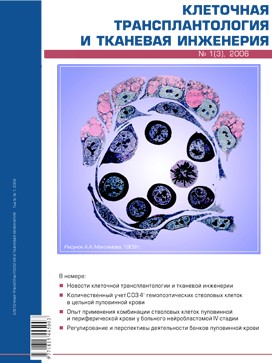Analysis of laboratory screening for cord blood banking
- Authors: Tyumina O.V.1, Gusarova G.I.2, Pavlov V.V.3, Zharkov M.N.1, Volchkov S.E.1, Toropovsky A.N.1, Krasnova N.N.4, Nizhegorodtseva I.A.4, Rossiev V.A.4, Savchenko V.G.5
-
Affiliations:
- State Unitary Enterprise of the Samara region "Volga Hematopoietic Cell Bank"
- Ministry of Health of the Samara Region
- Samara State Medical University
- Samara Regional Hospital named after M.I. Kalinin
- Hematology Research Center of the Russian Academy of Medical Sciences
- Issue: No 1 (2006)
- Pages: 72-73
- Section: Original Study Articles
- Submitted: 19.01.2023
- Accepted: 19.01.2023
- Published: 06.03.2023
- URL: https://genescells.ru/2313-1829/article/view/126652
- DOI: https://doi.org/10.23868/gc126652
- ID: 126652
Cite item
Abstract
The purpose of the study is to analyze laboratory screening for the presence of infectious agents in the procurement of cord blood for public use. We examined 586 donor PC samples by immuno-enzyme analysis in the first 24 hours after delivery for the presence of the following serological markers: NiѴ-1 and-2 Ag/Ab, Anti-HBcor, HBS-Ag, Anti-HCV, Anti-CMV, Anti-Toxoplasma gondii, Anti-HSV-1 and -2, RW, bacteriological examination of PC samples was also carried out. It was found that 73 [12.5%] PC samples were disposed of due to infectious danger. Of these, a positive analysis for HBs-Ag was detected in 3 samples [0.5%]; Anti-HCV - in 5 samples [0.9%]; RW — in 6 samples [1%]; Anti-HBcor - in 59 samples [1O%]. The percentage of germination of microbial contaminants was 0.1%. Thus, in order to reduce the percentage of PC samples disposal, an Anti-HBcor analysis should be included in the mandatory laboratory screening of female PC donors. The use of closed methods of blood sampling and processing, as well as ready-made universal media, allows virtually eliminating the possibility of contamination of PC samples with aerial flora.
Keywords
Full Text
About the authors
O. V. Tyumina
State Unitary Enterprise of the Samara region "Volga Hematopoietic Cell Bank"
Author for correspondence.
Email: redaktor@celltranspl.ru
Russian Federation, Samara
G. I. Gusarova
Ministry of Health of the Samara Region
Email: redaktor@celltranspl.ru
Russian Federation, Samara
V. V. Pavlov
Samara State Medical University
Email: redaktor@celltranspl.ru
Russian Federation, Samara
M. N. Zharkov
State Unitary Enterprise of the Samara region "Volga Hematopoietic Cell Bank"
Email: redaktor@celltranspl.ru
Russian Federation, Samara
S. E. Volchkov
State Unitary Enterprise of the Samara region "Volga Hematopoietic Cell Bank"
Email: redaktor@celltranspl.ru
Russian Federation, Samara
A. N. Toropovsky
State Unitary Enterprise of the Samara region "Volga Hematopoietic Cell Bank"
Email: redaktor@celltranspl.ru
Russian Federation, Samara
N. N. Krasnova
Samara Regional Hospital named after M.I. Kalinin
Email: redaktor@celltranspl.ru
Russian Federation, Samara
I. A. Nizhegorodtseva
Samara Regional Hospital named after M.I. Kalinin
Email: redaktor@celltranspl.ru
Russian Federation, Samara
V. A. Rossiev
Samara Regional Hospital named after M.I. Kalinin
Email: redaktor@celltranspl.ru
Russian Federation, Samara
V. G. Savchenko
Hematology Research Center of the Russian Academy of Medical Sciences
Email: redaktor@celltranspl.ru
Russian Federation, Moscow
References
- Gluckman Е., Broxmeyer Н.Е., Auerbach A.D. et al. Hematopoietic reconstitution in a patient with Fanconis anemia by means of umbilical-cord blood from HLA-identical sibling. N. Engl. J. Med. 1989; 321:1174-8.
- Gluckman E. Hematopoietic Stem-Cell transplants using umbilical-cord blood N. Engl. J. Med. 2001; 344 [24): 1860-1.
- S.Rubinstein P., Dobrila L., Rosenfield R. E. et al. Processing and cryopreservation of placental/umbilical cord blood for unrelated bone marrow reconstitution. Proc. Nat. Acad. Soi. USA 1995; 92[22): 10119-22
- Приказ М3 РФ №364 от 14.09.01 «Об утверждении порядка медицинского обследования донора крови и её компонентов».
- Приказ М3 РФ №325 от 25.07.03 «О развитии клеточных технологий в Российской Федерации»
Supplementary files










